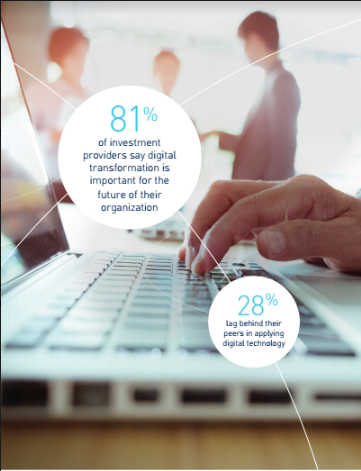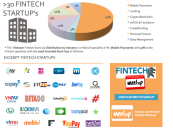
Digital Disruption in Finance is Here, But Investment Firms Slow to Become Digital Leaders
by Fintech News Singapore February 27, 2017A global survey of 2,000 investors and 500 investment providers supported by State Street has identified three aspects of data that will define stewardship for the digital age.
Integration, the ability to combine both structured and unstructured data; Intelligence, the ability to draw new insights with the help of emerging technologies that will enable improved decision-making, performance measurement and client centricity; and Integrity, the ability to better safeguard data with the highest levels of security.
The new report titled, “Finance Reimagined: Finding Long-Term Value in a Digital Age”, combines quantitative research with views from industry experts, to explore how firms across the financial services industry are using digital technologies to enhance their businesses.
The 150 investment providers surveyed in Asia Pacific (APAC)2 — including universal banks, mutual funds, alternative investment firms and fintech start-ups — cited new technology as one of the main trends redrawing the marketplace in the next five years; and 87 percent say digital transformation is important for the future of their organization.
Despite this clear understanding of the importance of digitization, providers in the region showed great variance in their pace of embracing new technologies:
- Overall, Japan-based investment providers are ahead of their peers surveyed in APAC on the path to digital transformation. Australia-based providers come second and are followed by China and Hong Kong.
- Among all aspects of digital transformation, APAC investments providers are most advanced in terms of developing an innovative culture, with 72% respondents in Japan, 40% in Australia and 26% in China/Hong Kong claiming to have achieved this.
- 58% of Japan-based respondents (vs. 56% of respondents in Australia and 14% in China/Hong Kong) are at an advanced stage of applying robust cyber security measures that ensure data integrity.
- 54% of Japan-based respondents (vs. 30% in Australia and 22% in China/Hong Kong) are fully harnessing data and analytics to improve decision making.
- Across the APAC region, respondents feel relatively unprepared when it comes to setting up systems to identify important emerging technologies such as blockchain and artificial intelligence, with only 9% in the region (12% in Australia and Japan respectively, 2% in China/ Hong Kong) claiming to be at an advanced stage.
- 86% of China/ Hong Kong respondents (vs. 72% in Australia and 56% in Japan) aren’t currently in an advanced stage of building an integrated, omni-channel approach to digital transformation.
“Digital transformation is driving a seismic shift in the investment industry,” said Lou Maiuri, head of State Street’s Global Markets and Global Exchange businesses. “While it’s critical to understand how new technologies can deliver immediate improvements in efficiency and insight, to become digital leaders, those in the finance industry also need a long-term vision for digital transformation that goes beyond simply adding the latest technologies to an existing infrastructure.”
“This survey underscores the importance with which providers in this region view digital transformation,” said Mark England, Head of Asset Manager Sector Sales, Asia Pacific. “The region has some unique challenges, in terms of localized investor needs and a complex regulatory environment. The winners will be able to navigate these challenges while forging enterprise-wide digital transformation and a culture of sustained innovation in their organizations.”
The report also identifies how investment firms can recognize and act on opportunities to digitize aspects of their organizations by highlighting several shared beliefs of digital leader globally:
- Adequately invest in new technologies like cloud and artificial intelligence is critical
- Prioritizing cybersecurity is the foundation for building solid client relationships based on trust and transparency
- Having the right talent and a strong customer-centric focus will accelerate organizations’ journey to a digital future
“We’re focused on how deep-rooted digital innovation can generate new value for our clients by developing highly personalised, data-driven products that appeal to a broader range of investors,” continued Maiuri. “By increasing the ability of institutions to understand and act on their investors’ needs, the three I’s enable the financial leaders of the future to create transparent, flexible services that increase trust and confidence in the sector — redefining stewardship for the digital era.”

Digital Age
Like firms, individual investors surveyed globally believe digital technology is the way forward, and admit they are more likely to work with established financial partners over fintech companies.
- 82% of investors say their provider will need to stay at the forefront of technology in the next five years
- 63% will want personalized advice in the future, and 59% expect to use do-it-yourself capabilities such as tools that enable them to self-manage their investments
- 40% say they would avoid fintech businesses due to higher cybersecurity risks
“New digital technologies will enable firms to provide a more fluid, dynamic and interactive investment experience for clients,” added Antoine Shagoury, chief information officer, State Street. “Moreover, they will help the industry to deliver the type of personalization investors are increasingly demanding, at scale. Firms that neglect to understand and embrace emerging technologies from Blockchain to artificial intelligence will also fail to remain competitive in this new era of finance, while those who live and breathe the digital revolution will be those who define the future of the sector.”
Featured picture via Flikr.com by Steve Johnson







